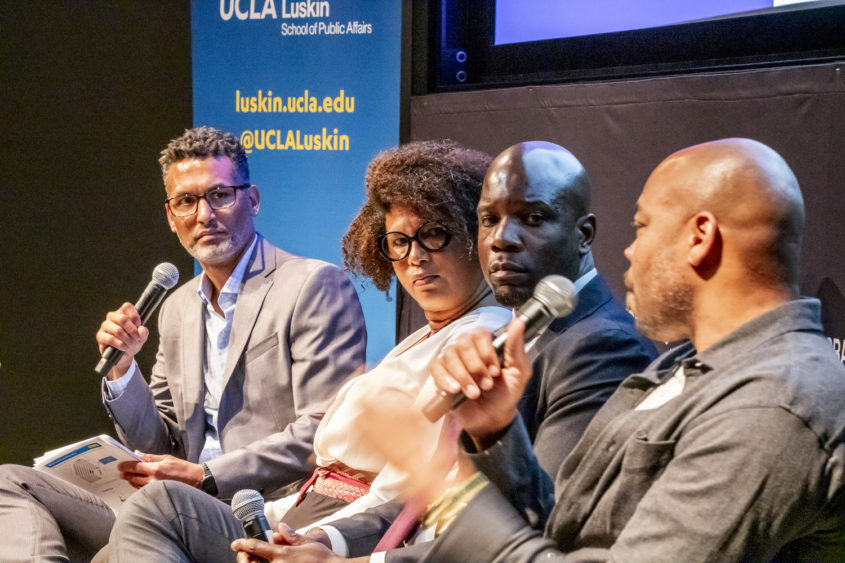
Building Up Communities of Color Three Black real estate professionals committed to investing in low-income neighborhoods share their successes and struggles
By Mary Braswell
Former Los Angeles Laker Devean George’s second career as a builder of safe and affordable housing for communities in need was inspired, in part, by his conversations with children.
In his 11-year NBA run, including three championship seasons in L.A., George used his platform to connect with young people across the country — “to really open up kids’ minds to dreaming and thinking there’s another world outside their four walls.”
But the encounters often came with a reality check, George told a UCLA Luskin Lecture audience on May 9.
“I’m thinking to myself, I’m going to talk to kids and say, ‘Hey, eat your vegetables and you’ll grow like me and get good grades,’” he said. “And they don’t really know where their next meal is coming from or where they’re staying.
“They’re staying at Grandma’s house tonight or with their mom’s boyfriend tomorrow, or they’re somewhere else so they’re missing school.”
The stark need for safe, stable housing options across the country led him to create the George Group North development company and Building Blocks nonprofit in his hometown of Minneapolis. His first housing venture there includes a gathering space for youth, with homework help and food provided by the local school district.
At the Luskin Lecture at the National Center for the Preservation of Democracy in downtown Los Angeles, George came together with two other Black real estate professionals to share the struggles and successes of building up neighborhoods of color.
Malcolm Johnson launched Langdon Park Capital in Los Angeles in 2021, with a focus on preserving and upgrading existing properties to house low- and middle-income families. He, too, transitioned into the real estate industry after a stint in professional sports, as a wide receiver for the NFL’s Cincinnati Bengals, New York Jets and Pittsburgh Steelers.
Malika Billingslea is a senior development advisor to NEOO Partners, a commercial real estate firm based in St. Paul, Minnesota, that works to elevate Black voices in the industry. “This rings true every time I think about affordable housing: If you don’t ask me, it’s not for me,” Billingslea said.
The lecture was part of a larger conversation about housing development and social justice taking place at UCLA Luskin, which is launching a new master’s degree in real estate development in fall 2025.
Housing scholar Michael Lens moderated the dialogue, making this foundational observation: “If we’re going to have a conversation about Black people building housing in Black communities, we need to start by talking about why so few Black people are working in development, really in any capacity.”
Nearly 111,000 of the 112,000 real estate development companies in the United States are white-owned, and only 2% of their chief executive positions are held by Black men — “and surely the number is even lower for Black women,” said Lens, an associate professor of urban planning and public policy.
“That’s why it matters for us to be in the room — and not just in the room but making decisions,” said Johnson, who is a UCLA supporter through the Ziman Center for Real Estate.
He did point out that racial awareness can be a significant business asset when competing for capital.
“That is the reason that we’re able to make smart investment decisions in the Crenshaw District, Highland Park, Leimert Park, Prince George’s County, Maryland, the East Bay. We actually have on our investment committee people with cultural competency in those submarkets,” he said. “So it’s not just diversity for the sake of diversity. That’s what investors will respond to.”
Johnson’s company is named after the recreation center that served as the heart of the diverse Washington, D.C., neighborhood where he grew up. Now, each of the buildings he has refurbished bears the Langdon Park name.
“There’s something powerful about owning in your community … but the economics mean that there are far more renters by necessity today, and that’s who we serve,” Johnson said. “So our idea of ownership is how can you take pride in the building? … We provide amenities that meet their needs, just like you would have if you owned a single-family house.”
The panel offered up a wish list of policy changes that could remove barriers to housing justice.
Federal tax credits are supposed to encourage the development of low-income housing, Billingslea said, but “anybody that knows anything about tax code knows it’s ridiculously complex for no apparent reason.”
Intentionally or not, the system of bidding on projects often excludes small minority businesses, George said. The panelists called on lead developers to show diligence, flexibility and creativity to bring diverse talent into the fold.
Johnson said rent control ordinances can have the unintended consequence of curbing cash flow that can be reinvested in a building’s safety upgrades, renovations and tenant amenities, which then make the surrounding community more secure.
“Who’s ever been to a housing project and said, ‘This place looks like it has a lot of hope just because the rents are really low?’” he said. “That doesn’t work. A bunch of poor people with a low tax base means poor-performing schools, it means potholes that don’t get fixed, police that don’t show up.”
George underscored the impact of embedding social supports into housing ventures, a hallmark of his first model housing project in north Minneapolis, which opened in 2016. Professional athletes from around the country have asked George if he could help replicate the project in their own hometowns. And that’s why he now has housing projects in cities like New Orleans.
“Other football players and basketball players that I know were saying, ‘Hey, why don’t we get past the transactional things we’re doing for our communities, the turkey drives and the toy giveaways that are here today and gone tomorrow,’” George said. “What are we going to do for our community that can last? What can we do for our community that can be uplifting, bring more resources and provide jobs?”
Attended by government, nonprofit and philanthropic representatives, as well as students and members of the public, the lecture was co-sponsored by the UCLA Lewis Center for Regional Policy Studies, the UCLA Bunche Center for African American Studies and the UCLA Ziman Center for Real Estate.
Watch a video of the event and view more photos.



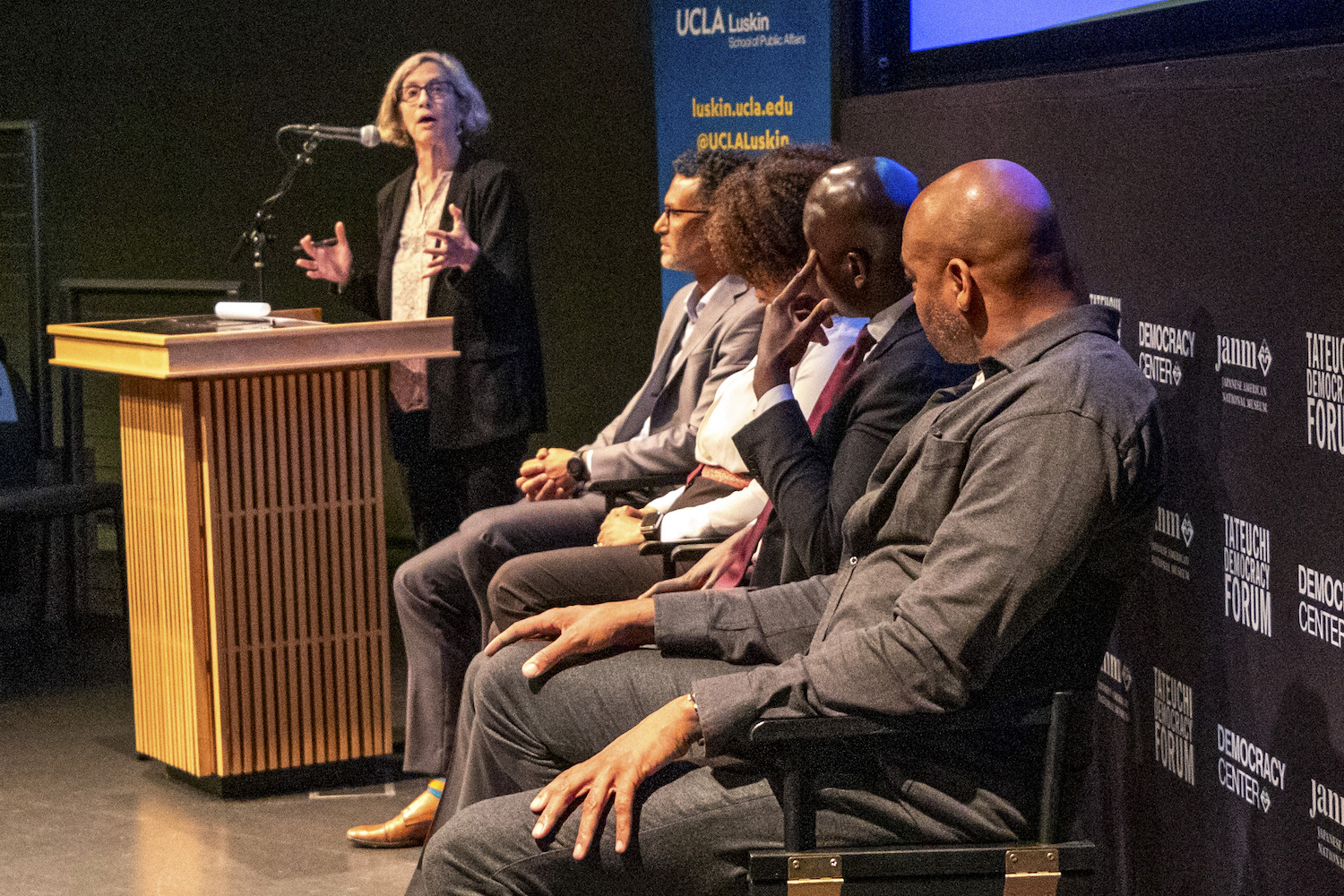

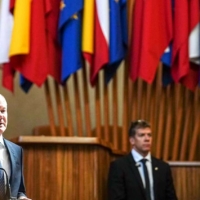
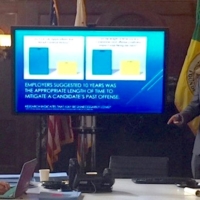
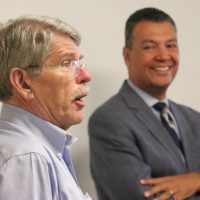
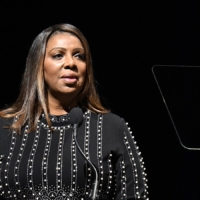
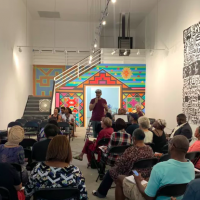
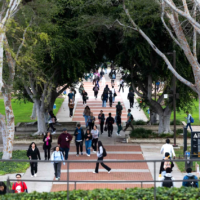



Leave a Reply
Want to join the discussion?Feel free to contribute!